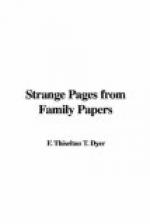In a farm-house in Sussex are preserved two skulls from Hastings Priory, about which many gruesome stories are current in the neighbourhood. One of these skulls, it appears, has been in the house many years; the other was placed there by a former tenant of the farm. It is the prevalent impression in the locality, that, if by any chance the former skull were to be removed, the cattle in the farm would die, and unearthly sounds be heard in and about the house at night time. According to a local tradition, the skull belonged to a man who murdered the owner of the house, and marks of blood are pointed out on the floor of the adjoining room, where the murder is said to have been committed, and which no washing will remove. But, on more than one occasion, the skull has been taken away without any ill-effects, and, one year, was placed by a profane hand in a branch of a neighbouring tree, where it remained a whole summer, during which time a bird’s nest was constructed within it, and a young brood successfully reared. And yet the old superstition still survives, and the prejudice against tampering with this peculiar skull has in no way diminished.[6]
There are the remains of a skull, in three parts, at Tunstead, a farmhouse about a mile and a half from Chapel-en-le-Frith, which, although popularly known by the male cognomen “Dickie,” has always been said to be that of a woman. How long it has been located in its present home is not known, but tradition tells how one of two co-heiresses residing here was murdered, who solemnly affirmed that her bones should remain in the place for ever. In days past, this skull has been guilty of all sorts of eccentric pranks, many of which are still told by the credulous peasantry with respectful awe. It is added,[7] also, that if “Dickie” should accidentally be removed, everything in the farm will go wrong. The cows will be dry and barren, the sheep have the rot, and horses fall down, breaking their knees and otherwise injuring themselves. The story goes, too, that when the London and North-Western Railway to Manchester was being made, the foundations of a bridge gave way in the yielding sands and bog, and, after several attempts to build the bridge had failed, it was found necessary to divert the highway, and pass it under the railway on higher ground. These engineering failures were attributed to the malevolent influence of “Dickie,” but as soon as the road was diverted it was bridged successfully, because no longer in Dickie’s territory.
A similar superstition attaches to a skull kept in a farmhouse at Chilton Cantelo, in Somersetshire. From the date on the tombstone of the former owner of the skull—1670—it has been conjectured that he came to the retired village, in which he was buried, after taking an active part, on the Republican side, in the Civil War; and that seeing the way in which the bodies of some of them who had acted with him were treated after the Restoration, he wished to provide against this in his own case.




